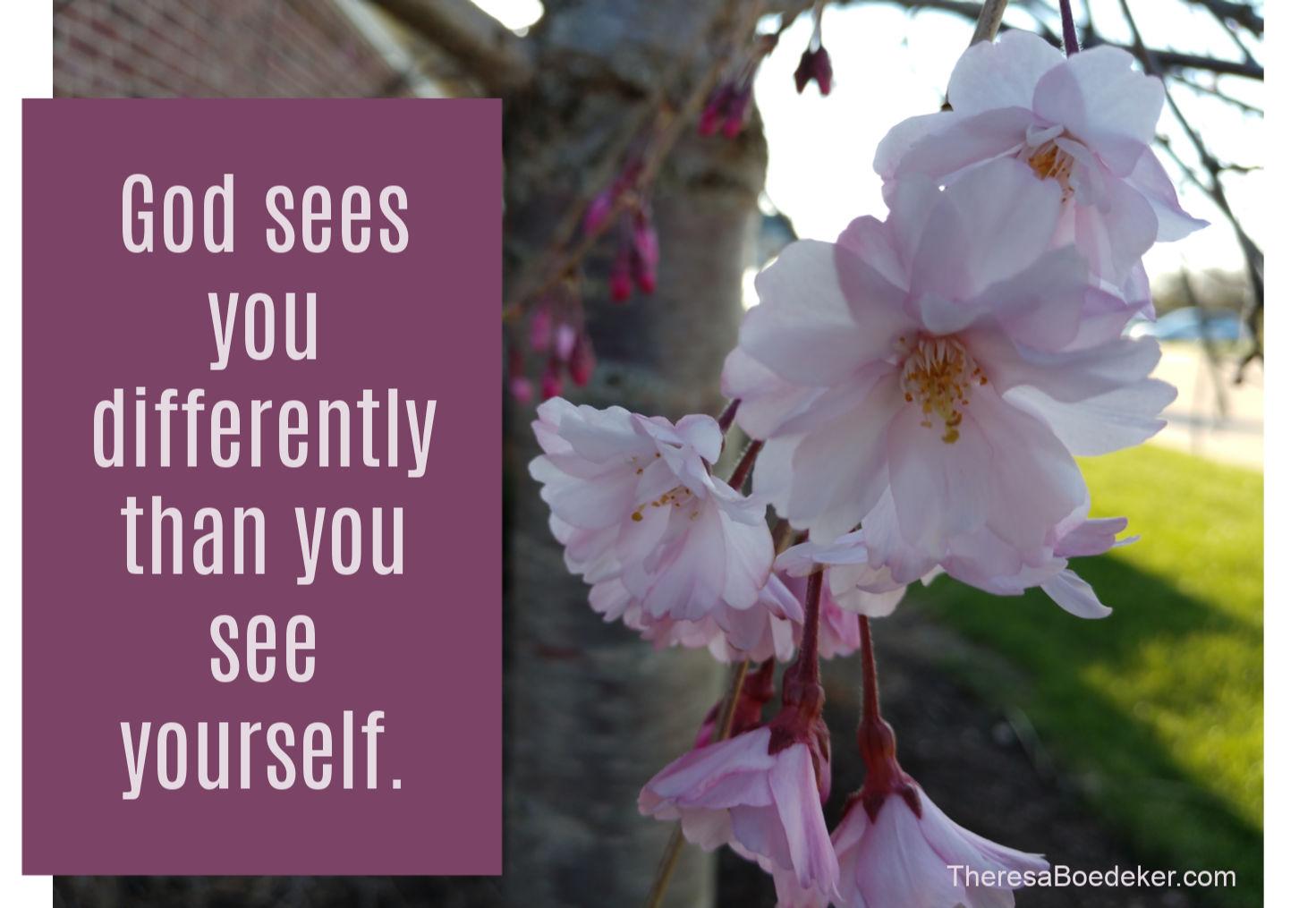Shame affects our identity by telling lies about who we are. To combat shame we need to know our true identity. Who we are. Where we come from. Our purpose. Our worth. This is post 8 in a series on shame.
I glanced at my husband’s bed. He was gone. Everyone was up but me.
I turned to the wall that started where my hospital bed ended and felt disappointment as I again realized I had not died during the night.
Not that I thought I would, but I kept hoping I would. It hadn’t taken but a couple of weeks for me to move past the happy-to-be-alive stage of grief. I was now entrenched in the why-had-I survived stage.
I was trapped. Trapped flat on my back in this hospital bed for about 23 hours a day for the next 4-5 months. Unable to sit up. Turn the light on. Get my daughter ready for school in the morning.
I couldn’t even get myself to the bathroom. I lay there waiting. Having to go but waiting my turn.
I wondered why I was even alive. I couldn’t do anything. I was nothing but a burden.
Just weeks earlier I had been voyaging through life, not even appreciative of all the freedom I had. A school bus hit our car and now I was lying in a perfectly flat hospital bed with a broken back and sweaty, rumpled bed sheets.
I listened to my six-year-old daughter take a shower and hurry through her morning routine. I used to be the one helping her get ready for school. Then going to work.
The front door finally slammed shut.
Let’s get you up and to the bathroom, my sixteen-year-old sister said, opening the bedroom door and grabbing my turtle shell she needed to strap me into.
I tried to fight back tears as she rolled me back and forth into the shell.
“You alright?” she asked, tightening the 4 side straps until they could go no tighter.
I gave a half smile. “Sure,” I said.
Inside I felt dead. I couldn’t tell her how I felt useless. Unlovable. Like a burden. That I was wondering who I was. That I was questioning why I was even alive.
I had no words to tell my sister, or even myself, that my identity felt lost, hiding at the bottom of the lowest canyon.
I felt shame for being where I was. For not being able to do. For being injured.

Shame affects our identity by telling lies about our identity.
Just like a jack-in-the-box, shame likes to pop its ugly head up and remind us we are broken. Not good enough. That our past defines our present and future. That we don’t measure up to everyone else. That we are not smart enough. Brave enough. Skinny enough. Good enough. Loveable or perfect enough.
Or maybe it is just telling us that we have not done enough. Proved our worth enough.
Lies about our identity is what shame likes to whisper to us.
It wants to whittle us down to size and kick us in the back.
It wants us to forget who we really are. Our true identity. And get us instead to focus on this false reality we think represents us.
Remember: the lies of shame come from us misinterpreting events or words that are directed at us. In trying to make sense of them, we tie them to our identity. We interpret them to be saying something is bad or wrong with us as a person. Believing these lies about our self, dismantles our identity.
Once we listen to the lie and start believing it, it starts distorting our identity. And as time goes on, we often keep validating and believing the lie unless we use truth to stamp out and discredit the lie.
How shame affects our identity is that it says it is all our fault. That we don’t measure up. That we need to try harder, do more, and hide our true self.
Notice that shame never encourages us. Loves us. Has empathy. Allows us to be human. Or accepts us faults and all.

We are much more than our labels.
Shame not only tells us lies about ourselves, but it loves labels. Labels that we carry as negative signs and that change or negate our identity. Labels that attack the core of our character and us as people.
Let’s look at how shame uses labels to affect our identity.
Shame tells us we are a liar. Not that we lied.
It tells us we are stupid. Not that we did something stupid.
It tells us we are cancer. Not that we have cancer or overcame cancer.
It tells us we are abused. Not that we have been abused or survived abuse.
It tells us are depressed. Not that we struggle with depression or have walked through depression.
Rebekah Lyons, author of Rhythms of Renewal, says the problem with labels is, “We shift from believing a particular label is something we face to believing it’s someone we are.”
Shame criticizes all (the whole) of us, who we are; not what we did or what we are facing. Or what we survived, or have overcome, or are walking through. It doesn’t separate our identity from the words, the label, or from the event.
And when we believe these lies of shame, then our identity is compromised.
How can our identity be correct when we believe lies about our self? It can’t be.
This was happening to me. I was believing lies about myself. I was wearing the label of worthless. Cripple. Not helpful. And I was viewing myself with disgust and criticism.
When the truth was far different.
If someone had asked me back then, those many years ago, if I thought someone was useless if they were incapacitated for a few months, I would have laughed and said, of course not. But like we so often do, I was judging myself through a different lens than I would have judged them.
It was alright for them to recover and do nothing but heal for several months. But me? I needed to be up and doing. Performing. Ranking up points for my worth to matter.
Not that I consciously thought this, but unconsciously I did. Partly because that was how I was raised. Partly because that is what our society tells us. Partly because I was believing the lies of shame.

We all have been duped.
Our enemy is the father of lies. And he has been telling lies and half-truths since the Garden of Eden.
None of us gets to adulthood without believing some lies about our identity.
Not one of us.
Many of these lies that we believe today about ourselves, others, and the world, were formed when we were growing up. Before we had the maturity to evaluate and be able to tell a lie from the truth.
So, don’t feel bad. We are all in the same leaky boat.
So, what are we to do? How do we discover our true identity?

Why we need to know our true identity.
To combat shame, we need to know our identity. I am not talking about the identity we cultivate and present to those we are trying to impress. Nor am I talking about the late-night identity dressed in old pajamas eating chocolate bars and bingeing on Netflix.
I am talking about all of you. Warts, boils, smooth skin, and designer sundress. The kit and caboodle. All of you. The good, bad, and pretty scary.
Our enemy want us to never know, I mean really know, our true identity. He wants us trapped. Isolated. And believing lies about ourselves.
When we don’t know our true identity, we don’t know our past or our future and our hope and peace is compromised. We don’t know the truth about us and we can’t combat the lies we hear about ourselves from others, from ourselves, and from society.
But when we know the truth about our identity:
We have patience with others, and patience with ourselves.
We accept others, and accept ourselves.
We love ourselves, and we love others.
We forgive ourselves, and we forgive others.
We give grace to others, and grace to ourselves.

We often base our identity on shifting sand.
As humans, our identity can shift from moment to moment. Experience to experience. Idea to idea. Or emotion to emotion.
Back and forth. High and low. We bob like a cork trapped in ocean currents.
Our boss praises our idea. And we feel good. Then our child complains about dinner and we feel bad.
We have a wonderful night out with our girlfriends and we are up. Then we see that the neighbors had a party without us and we dip down.
We yell at our kids and feel low. Then we hear bad news about our blood test, and we dip lower.
We reach a goal and feel confident, then a family member reminds us of our past faults, and we sink below ocean level.
I feel like I am excelling with all my doing and working and helping, and then I find myself trapped in a hospital bed and feel worthless.
Can you identify?
This is what happens when we base our identity on things other than our true identity.
When we base our identity on our emotions, experiences, performance, ideas, behavior, circumstances, past, success and failures, good and bad experiences, day, labels, expectations, self-imposed rules, or anything else.

So, what’s our true identity?
First, it is the truth.
Like, all humans have dignity and worth. No one is perfect. Our past doesn’t predict the future.
But human truth only goes so far. It’s not unconditional. It’s not based on something bigger than ourselves or greater than our wisdom.
But if we are Christian. Our true identity is rooted in our heavenly father.
Truth itself. Which is solid. Trustworthy. Never changing.
Which means we need to know God and what he says to know our true identity.
But when we do, we will know who we are. Our purpose. Where we are going.
Our identity will not be based on what we think, say, and do. It will be based on what he says, thinks, and does.
Here’s a very simplistic explanation. Just like my children have worth, love, and importance because I treat them that way and tell them so, we have worth, love, and importance because our creator says it is so and treats us that way.
It’s up to us to believe him and act like we do. Or we can choose to ignore what he says and argue with him and try to prove him wrong.
When our identity is found in who God says we are, we experience the freedom to be ourselves. Our identity is solid, not hopping up and down like the stock market.
This doesn’t mean we don’t see our shortcomings, have goals, exhibit emotions, worry, experience trials, or fail.
But it does mean that we keep going back to his truth. His truth about himself and about us. And about our relationship with him. And that grounds our identity.
And it smashes the lies that crop up trying to whittle away and distort our identity. Shame has no foothold when truth is present.
How did Jesus defeat Satan when he was tempted in the wilderness? He quoted truth to him. Truth wins. End of story.
Our identity tells us our past story and where we come from. Where we are going. Who wins this battle. Our glorious future. How we treat ourselves. And treat others. That we are not alone and that we have someone to carry our burdens.
In short, our identity gives our life meaning. Hope. Purpose. Joy. Peace. Love. Grace.
It allows us to be ourselves and not try to imitate and be someone else.

Remember God’s truth and base your identity on it.
Years ago, I may have been stuck in that hospital bed unable to do much, but my true identity had not changed.
Even if I could no longer work. Take care of my husband or daughter. Or get up and do and perform. God loved me the same.
He wasn’t going to turn his back on me because I couldn’t attend church or didn’t pray.
His care for me was not dependent on what I said or did.
Or on the rules I had made for myself, like making dinner and keeping a clean house. Or helping family.
Or whether I had a shower and got dressed.
My relationship with him was secure. My identity was secure. There was nothing I could do to change it. Nothing.
Not even being angry at him. Or wishing I had not survived.
My purpose never changed. Hospital bed or not. Neither did my future.
And my time was not wasted. Though it felt like it to me, as I lay there day after day unable to do anything, God used that time for my good. And one day I would look back and realize this truth.
If I could go back to that barely thirty me, lying in that bed and facing my first big life changing trial that was making me doubt my identity and worth, I would give myself a hug. And then remind myself that my identity is not about doing, but about being.
My identity was not about me, but about him.
And I want to do the same for you. Give you a big hug and tell you the same thing.
Your identity is not about you, but about him.
So, walk in truth. In confidence.
No matter where you find yourself, what situation you are trapped int, or what you are fighting, your identity is secure.
We won’t know in this world how much God really loves us, but we can gain a deeper understanding with each passing week and year.
Know that God unconditionally loves you: sins, personality quirks, temptations, character traits, habits and all.
Want to know some of the wonderful and loving ways God sees you? Print off this PDF file. 31 Ways God Sees You: Your True Identity

Check out this resource that covers everything you need to know about shame, including frequently asked questions.
Or take the Shame Quiz and begin to identify how shame is distorting your identity and worth. Once we know the lies that shame is wanting us to believe, we can more easily crush them with the truth.
Thanks for stopping by. Keep remembering what’s important.
Theresa
Download a free guided exercise to help you heal from shame
Download a free PDF freebie, “What to Do When You Are Feeling Shame: A Guided Exercise.” It will walk you through some practical exercises to deal with shame. Ending with how to avoid feeling shame in the future. My passion is to see you living shame-free; in glorious freedom. “What to Do When You Are Feeling Shame: A Guided Exercise” can help you step towards that freedom by breaking the lies of shame you believe and replacing those lies with the truth.
From Shame to Grace: How to Erase Shame From our Identities, a 12 part series. — Other posts in this series on shame include:
We Are Not Meant to Live in Shame
There is No Shame in Feeling Shame
How the Lies of Shame Cause Us to Think We Are the Defective Ones
Environments Where Shame Thrives
The Symptoms of Shame and the 4 Ways It Makes You Feel
12 Ways That Misinterpreting Events Causes Shame
Shame versus Guilt: What’s the Big Difference?
Combat Shame by Knowing Your True Identity
Why We Use Shame On Others and Ourselves: 6 Eye Opening Reasons
Shame: Recognize It, Heal From It, Walk in Freedom
What If Shame Has a Bigger Purpose Than Us?
Spiritual Shame: What It Is and How to Conquer It

Join the discussion: What labels do you need to toss off your identity or re-frame? In what ways do you need to see yourself differently and more like God sees you?

May link up at Kelly Balarie (#purposeful faith), Crystal Storms (#HeartEncouragement), Maree Dee (#Grace & Truth), Anita Ojeda (#inspirememonday), InstaEncouagements ((IE Link-Up), and Mary Geison (#tellhisstory).

- How Knowing Your Husband Can Impact Him for Good - March 24, 2022
- How to Stop Focusing on What’s Wrong with You - March 9, 2022
- Is God Really Good All the Time? - February 24, 2022
Oh, what a horrible thing to withstand, but what wonderful lessons you are bringing us all through it.
Thanks, Lauren. So many times we get through a trial or difficult period and later, upon looking back, see benefits from the exact same thing we were wishing would end. God never wastes anything.
What a powerful and personal post, Theresa. I can now understand why you write about shame with such insight.
We are all human, we are all imperfect, but when we do something stupid that does not mean we ARE stupid.
I loved this: ” we have worth, love, and importance because our creator says it is so and treats us that way.” Our way out of shame is through Christ.
Theresa as I read this beautiful post so full of Truth, I can relate, but yet it feels more like a memory now of how I used to be. Granted the memory is just a few weeks old, but I’m healing from ick I’ve been carrying for 40 years. Thank you for helping me understand so I can let it go. I’m so sorry you went through this. But you’re- God continues to use it for good. I’m grateful that you obey Him and make yourself available to be used by Him. Hugs to you my friend
Hugs to your friend for healing and letting go of the stuff that is weighing you down. You are becoming a new creature in Christ. Blessings on your journey and process. And remember that no matter where we are in life, learning, and growing, God couldn’t love us more.
Thanks, Laurie. At the time, I didn’t know I was feeling shame, but now when I look back I can see I was. Even though the accident was not our fault, I felt shame for being injured, for not doing, for being a taker (needing help and not being the one giving help). Shame enjoys making us think we are the defective ones, when the truth is so different. Yes, our way out of shame is through Christ. It is not about what we think or feel or believe, it is about what he says.
Theresa,
It’s interesting that my trust in my identity grew when, for two months, I could do absolutely nothing while recuperating from one of many surgeries. I was dependent upon others for everything. I couldn’t do any of the things that I was used to doing, but like you said, God’s truth is the bottom line answer. If forced me to bask in His word where my true identity was found. I had to work on countering all the lies that the enemy was lobbing at me. I had to do it so much that the truth about Whose I was in Christ began to really sink in. I may have flaws, but they don’t define me in God’s eyes. It took a crisis in order for God to get my attention to allow His Truth to sink in. Awesome series!
Blessings,
Bev xx
Bev,
It is interesting how a crisis gets our attention and teaches us about God and his truth. It was that accident and lying in bed for so long that helped me see that my identity was not based upon my performance and what I could do for others and God. It took time. But eventually I saw that whether I was up or lying still, my worth was the same in God’s eyes. Which was so contrary to the messages I had absorbed. So glad that when you were unable to do anything, you were able to grow in your identity. It is a truth we all need to learn if we don’t want our identity shooting up and down with life.
Many blessings,
Theresa
What a difficult season this was in your life, Theresa! And I know I would have felt the same way, with not only feeling shame, but guilt for not doing more even if I physically couldn’t! It does seem so silly when we look at it objectively, but so easy to feel and think when we’re the ones lying helpless in a bed! Thank you for sharing these lessons you’ve learned from that time too. Knowing our identity in Christ truly is crucial to our ability to do anything of any significance. Great word to us today! Pinning and tweeting this, my friend!
Hi Beth! God uses everything in life to teach us lessons. That time was hard, but God doesn’t waste our time in this life. Lessons abound everywhere. And it does seem silly to be worrying that I am not being productive when I am in bed with multiple broken bones. But then our thoughts are not always logical and can mislead us. That’s why we need God’s truth. To help show us when our thoughts are off kilter. Thankfully God meets us where we are and ministers to us where we are.
Amen! Fear isn’t the only liar! Shame is as well (I think they’re twins). Our identity is in Christ alone—he alone can fight the liar and win every time.
I agree Anita. Shame and fear are probably twin liars! Thankfully the truth of Christ can silence these bullies.
Wow, Theresa, I can’t imagine how difficult that season of your life must have been. This aspect of shame you shared really hit home:
“It doesn’t separate our identity from the words, the label, or from the event.” I do so much better in recognizing shame now than I used to. But you said something else that was spot on, and that was that we must remember our identity is in who God says we are, not in who shame or any other person or thing says we are.
There’s such peace to be found in this truth. Thank you for sharing so transparently!
I am trying to remember that many different things, people, and experiences shape us as people, but our identity comes from who He says we are. I don’t create my identity. He does. This is so easy to forget, though. Especially when so many other voices are telling me differently.
When we understand who God says we are, we are more patient, more accepting, we love more and forgive easier, and we are more gracious all around. Thank you for these beautiful thoughts and reminders.
Thanks for linking up at InstaEncouragements!
Beautiful post! I didn’t know my true identity until I was well into adulthood. I believed the lies for years. When I learned that God is the Keeper of my identity and He will care for it with all the love He has everything changed. Happy Easter!!
Knowing our identity helps us know the identity of others. And treat them as God treats us.
Oh yes, Mary, love that phase, “keeper of my identity.” Knowing this does change everything. Happy Easter!